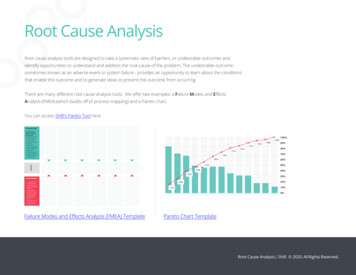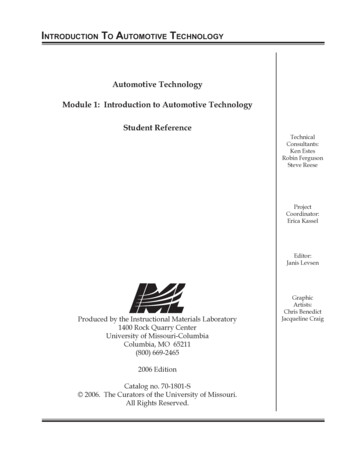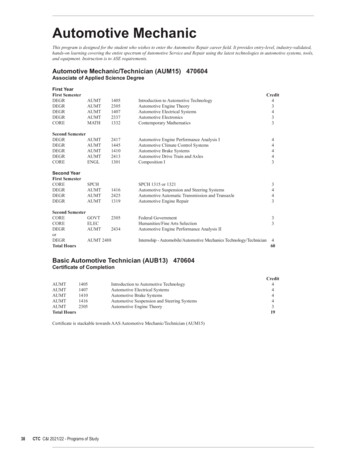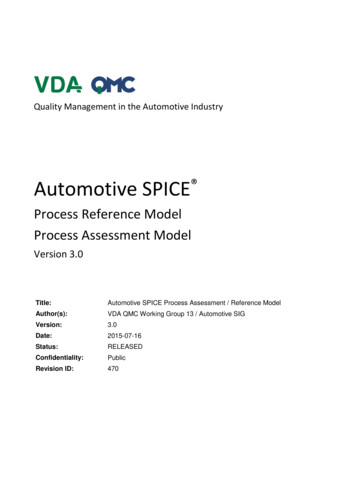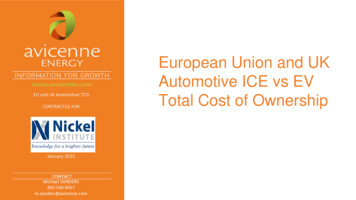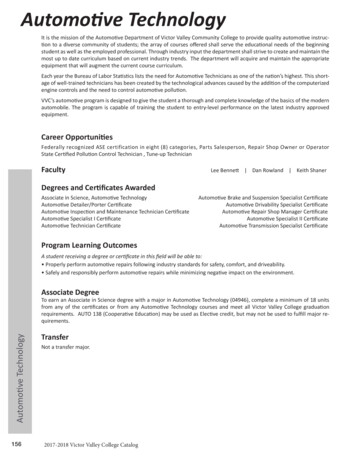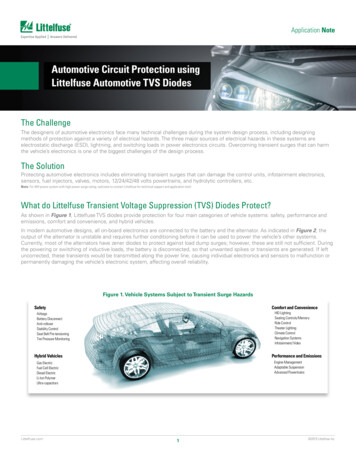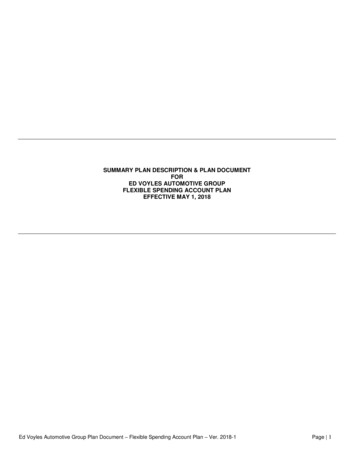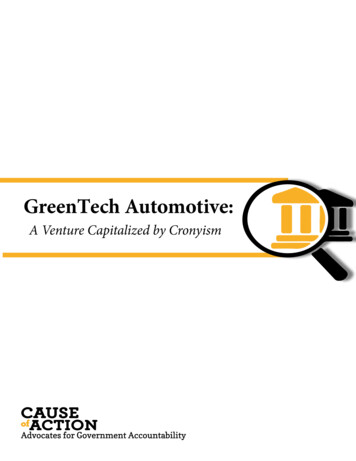
Transcription
GreenTech Automotive:A Venture Capitalized by Cronyism
Staff Investigative ReportGreenTech Automotive:A Venture Capitalized by Cronyism
About Cause of ActionMissionCause of Action is a nonprofit, nonpartisan government accountability organization that fights toprotect economic opportunity when federal regulations, spending, and cronyism threaten it. Ourmission is to expose the ways our government is playing politics in its use of taxpayer dollars, inits decision-making on behalf of individual Americans, and how it seeks to burden the economicopportunities that employ us and make our lives better. Cause of Action seeks to prevent thefederal government from politicizing agencies, rules, and spending by bringing transparency tothe federal grant and rule-making processes. Cause of Action’s representation of organizationsand individuals helps to educate the public about government overreach, waste, and cronyism.Investigative FunctionCause of Action uses investigative tools to attack federal government waste, fraud, andmismanagement as well as overreach in the form of arbitrary and burdensome regulations.Cause of Action employs “sunshine advocacy” tools to achieve its goals, including documentand information requests, lawsuits, ethics complaints, and requests for investigation. Through itsuse of advocacy and investigatory tools, Cause of Action promotes transparency, integrity, andaccountability in government. Cause of Action’s investigations help expose the ways ourgovernment is mismanaging federal funds and educate the public on how government can bemade more accountable. Rigorous oversight can prevent taxpayer dollars from being wasted onimproper activities.ii
Table of ContentsMission . iiInvestigative Function . iiI.Executive Summary . 4II.Findings. 7III.GreenTech Automotive: A Checkered Corporate History. 9A. Repo Man: Wang’s Battle for Control of GreenTech . 9B. The Fast Lane: Terry McAuliffe, GreenTech Chairman . 11IV. Under the Influence: How McAuliffe Greased the Wheels at the USCIS . 15V.GreenTech’s Tinted Windows . 18A. GreenTech’s Corporate Structure Creates a Conflict of Interest . 18B. GreenTech’s Other Potential Material Misrepresentations. 21VI. Roadshow: Chairman McAuliffe Pitches GreenTech to Mississippi & Virginia . 23A. Virginia Taps the Breaks . 24B. Mississippi Hits the Gas. 27VII. Recommendations . 31iii
I.Executive Summary“It seemed like a win for everyone involved when a startup car company, backed by politicalheavyweights, wooed investors with plans to build a massive auto plant in the Mississippi Delta,hire thousands of people and pump out a brand new line of fuel-efficient vehicles But today, thecompany is under a federal investigation and about the only thing on its land in Tunica County isa temporary construction office.”- Associated Press, August 12, 2013Less than half of all businesses started between 1977 and 2000 survived to five years.Market competition is cruel but it’s not unfair. Unfair is when political heavyweights use theirinfluence to skew the market and force taxpayers to underwrite the risk of speculative newbusiness ventures; taxpayers suffer while crony companies reap the profits. Such is the case withGreenTech Automotive, Inc. (GreenTech), a startup automobile manufacturer that promised jobsand economic growth in Virginia and Mississippi but has failed to deliver. The following reportis the latest from Cause of Action’s (CoA) investigations into companies that rely upon thepolitically powerful, not the competitive marketplace, to determine economic winners and losers.The story of GreenTech and its principals, Terry McAuliffe and Charles Wang, weaves atale of promises to invest billions of dollars and create thousands of jobs as a result of allegedtechnological breakthroughs. What is becoming increasingly likely, however, is that taxpayerswill instead bear the costs of broken promises by subsidizing a failed business that used politicalconnections and pressure to profit from taxpayer dollars.Terry McAuliffe has made a career of using politics to profit.As far back as 1997, Business Week declared that “[m]any of Terry McAuliffe’s businessdeals are intertwined with his political interests.” According to Leaders Magazine in 2007,McAuliffe “started over two dozen companies in the fields of banking, insurance, marketing, andreal estate. McAuliffe served as Chairman of Federal City National Bank and, most recently,was an owner and Chairman of American Heritage Homes.” These companies and his politicalfundraising career earned him millions in personal profit, but also brought Department of Justiceinvestigations, accusations of conspiracy and illegal donation schemes, and Department of Laborpenalties. What is clear is that political fundraiser and businessman McAuliffe has made a habitof using his connections and favors to rake in profits, and he has continued that pattern withGreenTech. After receiving campaign contributions from Charles Wang in 2008 for his firstgubernatorial bid, Terry McAuliffe made his deep political Rolodex available for GreenTech’sbenefit. As Amy Gardner from The Washington Post has observed, many of McAuliffe’s biggestbusiness deals “came in partnership with prominent donors and politicians, creating a portraitover the years of a Washington insider who got rich as he rose to power in the DemocraticParty.” He continued that pattern with GreenTech, benefitting the company through his ownpolitical connections.4
In 2008, Charles Wang made a 50,000 donation to Terry McAuliffe’s gubernatorialcampaign. Shortly thereafter, Wang’s company merged with what is now GreenTechand McAuliffe was named Chairman.As GreenTech Chairman, in an email to then-Governor Haley Barbour, McAuliffe citedefforts by U.S. Senators Thad Cochran (R-MS) and Roger Wicker (R-MS) to pressurethe United States Citizenship and Immigration Services (USCIS) Director AlejandroMayorkas into fast-tracking EB-5 visa applications that would provide Chineseinvestments for GreenTech.McAuliffe sent numerous emails to Director Mayorkas and Douglas Smith, Departmentof Homeland Security’s assistant secretary for the Office of the Private Sector,expressing frustration with USCIS’ slow visa approval process. Smith attendedGreenTech’s groundbreaking at its temporary Horn Lake facility, where McAuliffe alsoprivately met with President Bill Clinton and Chinese investors.Anthony Rodham, brother of former Secretary of State Hillary Clinton, is President andCEO of Gulf Coast Funds Management (Gulf Coast) the country’s largest RegionalCenter for processing EB-5 investments, and the manager of EB-5 investments forGreenTech.GreenTech utilized the EB-5 visa program as a catalyst for favors and a prop for businessdeals.In 2008, Gulf Coast, a sister company of GreenTech, used political pressure to positionitself as a powerful Regional Center for managing two states’ EB-5 investments, yielding largeprofits. GreenTech was financed by Chinese investors with a strong interest in securing visas inexchange for millions of dollars in capital through EB-5. Then-Mississippi Governor Haley Barbour, one of Terry McAuliffe’s current businesspartners, contacted Barbara Velarde, the head of the USCIS office that oversees theRegional Center program, urging the agency to designate Gulf Coast as the RegionalCenter for the entire state of Mississippi.Kathleen Blanco, who was Governor of Louisiana at the time that USCIS approved GulfCoast’s application, is currently a member of Gulf Coast’s board.Between 2009 and 2012, GreenTech raised 67 million from more than one hundred EB5 investors. Gulf Coast has collected a total of approximately 7.4 million in profits fromGreenTech investors.GreenTech is abusing taxpayer funds.Under the leadership of Charles Wang and Terry McAuliffe, GreenTech submittedexaggerated projections about its manufacturing output and job creation prospects, convincingMississippi state officials to award millions of taxpayer dollars in loans and tax incentives todevelop a GreenTech plant within the state. In exchange for a promise to build a manufacturing facility in Tunica County, theMississippi Development Authority (MDA) agreed to provide a 3 million loan to5
GreenTech from the Mississippi Industry Incentive Financing Revolving Fund toconstruct an access road to the facility.A 2 million loan was given to the Tunica County Economic Development Foundation topurchase the site on which the facility would be built. GreenTech received a host of taxbreaks and incentives including reduced state income, franchise, property, sales and usetaxes and income tax rebates for company employees.GreenTech has claimed that it will create 25,000 direct jobs that will each create 11.86indirect and induced jobs, or 296,500 jobs in total. This is problematic both inexpectation and legality given that current law provides for no more than 10,000 EB-5visas per year.While it is unknown whether GreenTech will meet its own estimate of 25,000 full-time jobs inMississippi by 2014, according to NBC12 News in Richmond, Va., a former GreenTechemployee claims that GreenTech’s “lofty goals were nowhere near reality.”What follows in this report are these and additional findings from a six-month investigation ofthe relationships and political deals that allowed GreenTech to entice Mississippi into amisbegotten experiment in green automotive technology. As this report reveals, the real enginedriving GreenTech’s business plan appears to be its management’s extraordinary talent forexploiting taxpayers to advance their own interests.6
II.Findings Finding: Charles Wang, a Wall Street-trained securities lawyer, acquired control ofGreenTech in August 2009 using a series of shell corporations. This resulted in acorporate coup and protracted federal litigation, where the federal trial court publiclyimpugned Wang’s integrity. Finding: Wang’s Hybrid Kinetic Automotive Corp. made a 50,000 donation to TerryMcAuliffe’s gubernatorial campaign in 2008. Shortly thereafter, Wang’s companymerged into what is now GreenTech—a transaction that qualified for review by theCommittee on Foreign Investment in the United States—and McAuliffe was namedChairman. Finding: As GreenTech’s Chairman, McAuliffe cited efforts by U.S. Senators ThadCochran (R-MS) and Roger Wicker (R-MS) to pressure United States Citizenship andImmigration Services (USCIS) Director Alejandro Mayorkas into fast-tracking EB-5visa applications for the company. Finding: GreenTech has violated USCIS regulations in every one of its four rounds offinancing by impermissibly structuring each investment as “risk-free,” jeopardizing itsinvestors’ chances at obtaining residency in the U.S. Finding: GreenTech’s affiliation with its EB-5 Regional Center, Gulf Coast FundsManagement (Gulf Coast), creates a conflict of interest that GreenTech has hidden fromits investors. Due to this conflict of interest, the Virginia Economic DevelopmentPartnership (VEDP) opposed McAuliffe’s request that Gulf Coast serve as a RegionalCenter for all of Virginia. Finding: GreenTech has made misleading statements to investors that potentially violateSection 17(a) of the 1933 Securities Act. Finding: GreenTech told investors in 2009 that the company would manufacture onemillion cars—which is more than 10% of the entire U.S. automobile industry’s annualoutput—within three to five years of the start of production Finding: GreenTech submitted exaggerated projections about its manufacturing outputand job creation prospects in its funding applications to both Mississippi and Virginia.Unlike Virginia, Mississippi state officials failed to conduct proper due diligence onGreenTech and ultimately gave the company millions in loans and tax incentives tolocate its manufacturing facility within the state. Finding: Documents from the VEDP show that GreenTech’s operations were structuredprimarily to obtain fees from Chinese green card applicants and to benefit McAuliffe’spolitical aspirations, not to build a successful automotive manufacturing business.7
Finding: The deal that GreenTech reached with Mississippi included an arrangementpertaining to U.S. Department of Housing and Urban Development CommunityDevelopment Block Grant funds that would have failed to comply with federalprocurement regulations requiring fair and open competition. Finding: Andrew Dulaney, the attorney for the Tunica County Board of Supervisors inMississippi, negotiated with GreenTech on behalf of Tunica County despite having aconflict of interest.8
III.GreenTech Automotive: A Checkered Corporate HistoryA. Repo Man: Wang’s Battle for Control of GreenTech Finding: Charles Wang, a Wall Street-trained securities lawyer, acquired control ofGreenTech in August 2009 using a series of shell corporations. This resulted in acorporate coup and protracted federal litigation, where the federal trial court publiclyimpugned Wang’s integrity.GreenTech is a U.S.-based manufacturer of energy efficient automobiles that started asHybrid Kinetic Automotive Holdings (HKAH), the vision of successful Chinese automotiveentrepreneur Yung “Benjamin” Yeung, a/k/a Rong Yang (Yeung). Yeung had previously servedas Chairman and CEO of Brilliance China Automotive Holdings, Ltd., the first Chineseautomobile company listed on the New York Stock Exchange, until he was accused by Chineseauthorities of “economic crimes” and forced to flee to America.1GreenTech’s very origins raise questions about the integrity of the company’s presentmanagement team. In 2007, Yeung hired securities lawyer Xiaolin “Charles” Wang asExecutive Vice President of Compass Pacific Holdings Ltd., a Hong Kong corporation owned byYeung.2 Wang had recently left prominent American law firm Cadwalader, Wickersham & Taftafter allegedly forcing businessman David Ji to sign over control of his electronics company toWang’s client.3 At the time, Ji was being held in custody by Chinese authorities.4Shortly after joining Yeung, Wang engaged in what a federal judge would latercharacterize as a “corporate coup,” seizing control of HKAH’s Mississippi-based operatingsubsidiary, Hybrid Kinetic Automotive Corp. (HKAC).5 Yeung sued Wang in the U.S. DistrictCourt for the Northern District of Mississippi in 2009 after discovering that Wang reissued theshares of HKAC, naming Wang’s Capital Wealth Holdings Ltd. as its parent owner.6 Wangadmitted that he accepting funding from Yeung even after quietly wresting away control of thesubsidiary.7 Wang also denied that Yeung had any voting rights or financial interests in HKACeven though Yeung had invested between 1.58 and 1.88 million.8 Judge Michael Mills, whopresided over the case, described Wang’s conduct as being “of dubious legality.”91Affidavit of Yung (Benjamin) Yeung (“Rong Yeung Mgmt. Biography”), Hybrid Kinetic Auto. Holdings, Inc. v.Hybrid Kinetic Auto. Corp., Civ. Act. No. 3:09-CV-35-M-A) (N.D. Miss. May 11, 2009) (“Yeung Affidavit”)(Exhibit 1).2Id. (“Wang Employment Agreement”) (Exhibit 2).3Decl. of Gary J. Gorham in Support of Plaintiffs and Third-Party Defendants’ Response to Court’s Order DatedJune 23, 2009 at 5, Hybrid Kinetic Auto. Holdings, Inc. v. Hybrid Kinetic Auto. Corp., Civ. Act. No. 3:09-CV-35MPM-DAS (N.D. Miss. July 17, 2009) (“Gorham Declaration”) (Exhibit 3); see also Stephanie Fitch, Held Hostagein China, FORBES (Nov. 14, 2005), http://www.forbes.com/home/free forbes/2005/1114/142.html.4Fitch, supra n. 3.5Hybrid Kinetic Auto. Holdings, Inc. v. Hybrid Kinetic Auto. Corp., 643 F. Supp. 2d 819, 822 (N.D. Miss. 2009).6Hybrid Kinetic Auto. Holdings, Inc. v. Hybrid Kinetic Auto. Corp., 629 F. Supp. 2d 618, 628 (N.D. Miss. 2009).7Hybrid Kinetic, 629 F. Supp. 2d at 628.8See Verified Complaint for Equitable Relief and Damages at 10, ¶¶ 34-35, Hybrid Kinetic Auto. Holdings, Inc. v.Hybrid Kinetic Auto. Corp., Civ. Act. No. 3:09-CV-35-M-A (N.D. Miss. Mar. 27, 2009) (Exhibit 4).9Hybrid Kinetic Auto. Holdings, 629 F. Supp. 2d at 629.9
For his part, Wang testified that Yeung had failed to make good on his promise to invest 200 million in what Wang described as a joint venture, without submitting documentaryevidence of any written joint venture agreement.10 Yeung scoffed at the allegations, denying thatany such agreement had ever existed and stating that an experienced businessman would neverinvest that amount of money in a startup.11In fact, Yeung’s legal problems had begun to interfere with his and Wang’s plans tofinance the company via the EB-5 Immigrant Investor Pilot Program.12 EB-5 is a 30-year-oldfederal program administered by the U.S. Citizenship and Immigration Services (USCIS) thatallows foreign nationals, along with their immediate family, to obtain permanent residency in theU.S. in exchange for investing 1 million in an urban for-profit business that creates ten or morefull-time jobs for U.S. workers within two years.13 When a commercial entity is located in arural or high-unemployment area, the amount of capital required to be invested is instead 500,000.14Wang testified that he had been informed by an official within the Chinese Ministry ofPublic Safety that there was still an outstanding arrest warrant for Yeung and that “the Ministrydoes not favor any fund raising [sic] activities in China if Mr. Yeung is managing HKAC.”15Shortly after HKAH paid Bill Clinton 300,000 to speak at a December 2008 event in HongKong, a South China Morning Post article raised questions about Clinton’s involvement with acorporation run by a mainland fugitive.16 It was around this time that Wang decided that HKACcould no longer afford “the political and financial risk associated [with] Mr. Yeung’s presenceon the HKAC board of directors.”17The court ultimately issued an advisory opinion that was favorable to Wang.18 Theparties subsequently reached a settlement in which Wang agreed to pay Yeung 1.5 million andto stop using the name Hybrid Kinetic.19 This case should have served as a red flag to federaland state agencies that subsequently interacted with Wang and his companies, includingGreenTech, especially given the “serious concerns” that the court had with Wang’s conduct.2010Id. at 623.Yeung Affidavit, supra note 1 at 6-7, ¶¶ 17-18.12Id. at 624.13Green Card Through Investment, U.S. CITIZENSHIP & IMMIGRATION tem.eb1d4c2a3e5b9ac89243c6a7543f6d1a/?vgnextoid nnel cf54a6c515083210VgnVCM100000082ca60aRCRD (lastvisited Aug. 27, 2013).14Id. GreenTech’s manufacturing facility in Tunica, Mississippi qualifies as an EB-5 project. See infra at p. 25.15Id. at 623.16Hybrid Kinetic Auto Holdings, 629 F. Supp. 2d at 620.17Id. at 624.18Id.19See Phil West, Courts Settle Auto Naming Rights, THE COMMERCIAL APPEAL (Aug. 9, g/09/courts-settle-auto-naming-rights/?print 1.20Hybrid Kinetic Auto. Holdings, 629 F. Supp. 2d at 629.1110
B. The Fast Lane: Terry McAuliffe, GreenTech Chairman Finding: Wang’s Hybrid Kinetic Automotive Corp. made a 50,000 donation toMcAuliffe’s gubernatorial campaign in 2008. Shortly thereafter, Wang’s companymerged into what is now GreenTech—a transaction that qualified for review by theCommittee on Foreign Investment in the United States—and McAuliffe was namedChairman.With Yeung out of the picture, Wang was free to team up with McAuliffe. Wang’srelationship with McAuliffe traces back to at least 2008, when HKAC made a 50,000 donationto McAuliffe’s 2009 Virginia gubernatorial campaign.21 HKAC later merged with a Mississippishell company named GreenTech Automotive in August 2009.22 The combined entity,GreenTech Automotive, then merged with McAuliffe’s WM GreenTech AutomotiveCorporation in March 2010.23Because HKAC was foreign-controlled, its merger with GreenTech should have triggereda review by the Committee on Foreign Investment in the United States (CFIUS).24 CFIUS is aninter-agency committee authorized to review transactions that could result in control of a U.S.business by a foreign person in order to determine the effect of such transactions on nationalsecurity.25 However, whether CFIUS reviewed the HKAC-GreenTech merger is unclear becauseCFIUS, in response to CoA’s Freedom of Information Act request, refused to confirm or denythe existence of records related to the merger.26 Additionally, GreenTech has not responded toinquiries about the issue.27 Consequently, the public can only speculate whether GreenTech hasevaded government oversight by exerting its political influence.McAuliffe served as Chairman of GreenTech from October 2009 until he quietly left thecompany in December 2012, a resignation that was not publicly announced for at least fourmonths.28 McAuliffe is still listed as the “Chairman Emeritus” of GreenTech and as thecompany’s largest individual shareholder.29 A longtime Democratic fundraiser and the financedirector for President Clinton’s and Hillary Clinton’s presidential campaigns, McAuliffe wasChairman of the Democratic National Committee from 2001 to 2005 and a founding member of21Infra note 113 and accompanying Figure 2.See, e.g., Sebastian Blanco, Hybrid Kinetic Reborn as Greentech Auto, Reveals Possible Line-up,AUTOBLOGGREEN (Oct. 7, 2009), .23See GreenTech Automotive, Inc., Share Exchange Profit Corporation (on file with the Office of the Miss. Sec’y.of State) (filed Apr. 12, 2011), available at pdf.2431 C.F.R. Pt. 800.25Id.26See Letter from Thomas Funkhouser, Deputy Dir., Bus. & Program Operations, Int’l Affairs, U.S. Dep’t of theTreasury, to CoA (June 12, 2013) (Exhibit 5).27Chris Good, The Complicated Legal Backstory Of Terry McAuliffe’s Former Car Company, ABC News (Aug. 28,2013), ackstory-terry-mcauliffes-carcompany/story?id 19959500&singlePage true.28Alexander Burns, Terry McAuliffe Left Car Firm in December, POLITICO (Apr. 5, 89684.html.29GREENTECH AUTO, INC., CONFIDENTIAL PRIVATE PLACEMENT MEMORANDUM 36 (Mar. 12, 2013) (“2013 PrivatePlacement Memorandum”) (Exhibit 6).2211
the Washington, D.C. lobbying firm McAuliffe, Kelly & Raffaelli.30 McAuliffe has a lengthyresume of political profiteering: McAuliffe used his political contacts to purchase real estate previously owned byAmerican Pioneer Savings Bank—a failed savings and loan association owned by hisfather-in-law—from Resolution Trust Corporation, the federal receiver that took overAmerican Pioneer’s assets and liabilities.31 Originally valued at 50 million, McAuliffewas able to purchase the real estate at 39 million.32 McAuliffe only spent 100 of hisown money in the transaction, while the International Brotherhood of Electrical Workersand the National Electrical Contractors Association fronted the rest.33 McAuliffe hadcome to know the union’s secretary, Jack Moore, through Dick Gephardt’s 1988presidential campaign.34 In June of 1991, McAuliffe joined with Tony Coelho, a former House Whip and memberof the Democratic Congressional Campaign Committee, and John Boland to form acommercial real estate company named The Boland Group, Inc.35 The Boland Groupwas instrumental in the sale and transfer of property from the Resolution TrustCorporation to American Capital Group.36 A notable principal at American CapitalGroup was Dorothy McAuliffe, Terry’s wife.37 McAuliffe earned 8 million from an initial 100,000 investment in Global Crossing andanother 1.2 million by helping Internet startup firm Telergy secure a 40 millioninvestment from Global Crossing’s founder.38 Global Crossing later declaredbankruptcy amid allegations of fraud and a collapse in the value of its shares.39 McAuliffe devised the idea of renting out the White House’s Lincoln bedroom toprominent Democratic donors during Bill Clinton’s presidency, going so far as to write amemorandum defending his plan.4030Amy Gardner, McAuliffe’s Ties to Lobbyists, WASH. POST (Mar. 26, itics/2009/03/terry mcauliffes ties to lobby.html.31Jeff Gerth, Friendship Counts: Clinton’s Top Fund-Raiser Made Lots for Himself, Too, N.Y. TIMES (Dec. 12,1999), lftoo.html?pagewanted all.32Id.33Id.34Id.35See, e.g., Amy Gardner, Va. Candidate McAuliffe Has History of Mixing Business, Politics, WASH. POST. (May 3,2009), le/2009/05/02/AR2009050202201.html.36Complaint, Gargan v. Coelho, No. 95-CA-006604 (D.C. Sup. Ct. Aug. 18, 1995).37Id.38Gardner, supra note 30.39Global Files for Bankruptcy, CNN MONEY (Jan. 28, obalcrossing/.40J. Jennings Moss, Big Game Hunter: Fundraiser Terry McAuliffe Knew How to Bag Big Donors for PresidentClinton, But Has the Stalker Now Become the Prey?, MOTHER JONES, Feb. 1997, available game-hunter.12
In 1995, the Department of Justice opened an investigation into a 375,000 contingencyfee that McAuliffe earned by helping Prudential Insurance Co. lease office space to thefederal government.41 The investigation ended after Prudential paid 317,500 to settle alawsuit over their failure to disclose the payment.42 In 1999, former DNC finance director Richard Sullivan testified in federal court thatMcAuliffe had urged him and other fundraisers to find a wealthy Democrat to donate 50,000 to the re-election campaign of Teamster’s president Ron Carey, in exchange fora 500,000 donation from the Teamsters to various Democratic Party committees.GreenTech has been using McAuliffe’s political ties to obtain taxpayer support for itscorporate ambitions ever since he took the wheel at the company. McAuliffe has helpedGreenTech obtain loans, tax breaks, and other incentives for the construction of a manufacturingfacility in Tunica, Mississippi, and pressured USCIS officials to expedite visa applications onbehalf of the company’s EB-5 investors. An e-mail from Jeffrey Anderson, President and ChiefExecutive Officer of the Virginia Economic Development Partnership (VEDP), to SandiMcNinch, the VEDP’s General Counsel, and other VEDP officials reveals that while McAuliffewas Chairman, GreenTech considered applying for federal assistance through the U.S.Department of Energy’s Alternative Technology Vehicle Manufacturing loan program. 43It was through Terry McAuliffe that Wang was able to acquire the final piece to his EB-5financing scheme. Investments in the EB-5 Immigrant Investor Pilot Program can only be madethrough USCIS-approved “Regional Centers,” which select and promote job-creating businessesto foreign investors.44 The Regional Center that administers EB-5 investments in GreenTech isGulf Coast Funds Management LLC (Gulf Coast), a Louisiana corporation.4541Gerth, supra note 31.Id.43Email from Jeffrey Anderson, President and CEO, Va. Econ. Dev. P’ship, to Sandi McNinch, Mike Lehmkuhler,Vice President of Bus. Attraction, Robert McClintock, Research Dir., and Roy Dahlquist, Managing Dir. (Asia), Va.Econ. Dev. P’ship (Nov. 19, 2009) (Exhibit 7).44EB-5 Regional Center: EB-5 Visa Regional Center, http://eb5info.com/pages/13-eb-5-regional-center (last visitedAug. 27, 2013).45La. Bus. Filings Search, LA. SEC’Y OF hForLouisianaBusinessFilings/Pages/default.aspx (enter “Gulf CoastFunds Management”) (last visited Aug. 27, 2013).4213
Gulf Coast’s President and CEO is Hillary Clinton’s brother, Anthony Rodham.46 OnAugust 5, 2008, Haley Barbour, then the Governor of Mississippi and a longtime McAuliffeconfidante and business partner,47 wrote to Barbara Velarde, the head of the USCIS office thatoversees the Regional Center program, and urged that the agency designate Gulf Coast theRegional Center for the entire state of Mississippi.48 Less than two weeks later, on August 18,2008, Gulf Coast become the largest Regional Center in the country when the USCIS approvedGulf Coast’s proposal to be a Regional Center for both Mississippi and Louisiana.49Interestingly, the Governor of Louisiana at the time, Kathleen Blanco, is now a board member ofGulf Coast.5046Gulf Coast EB-5 Experts: President & CEO: Anthony Rodham onyRodham.html (last visited Aug. 26, 2013).47Gerth, supra note 31.48Letter from Haley Barbour, Gov., Miss., to Barbara Velarde, Chief, Foreign Trade, Investor & Reg’l Ctr.Program, U.S. Citizenship and Immigration Serv. (Aug. 5, 2008) (Exhibit 8).49Let
Finding: Wang's Hybrid Kinetic Automotive Corp. made a 50,000 donation to Terry McAuliffe's gubernatorial campaign in 2008. Shortly thereafter, Wang's company merged into what is now GreenTech—a transaction that qualified for review by the Committee on Foreign Investment in the United States—and McAuliffe was named Chairman.

